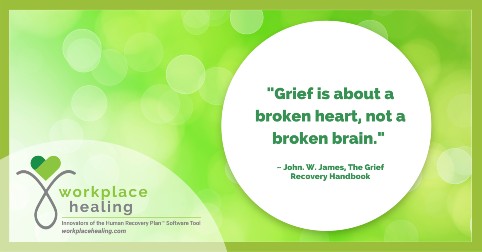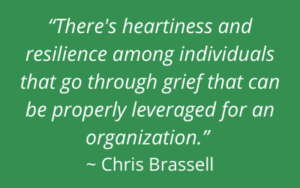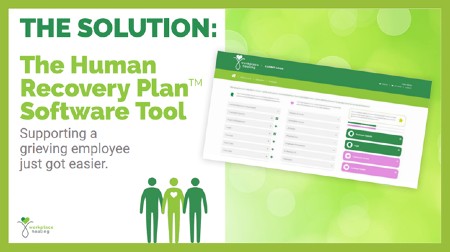
How Trauma Can Impact Leadership Skills
Part IV of our series on Post-Traumatic Growth in the Workplace. Trauma and grief experiences can foster long-term adaptive leadership skills that employers shouldn’t ignore. This special article series explores post-traumatic growth and how you can best support a grieving employee seeking meaning and purpose as part of their healing recovery process.

In the short term, a grieving employee may suffer from issues like brain fogginess, short-term memory loss, and loss of productivity. (To learn more about common symptoms of grief among employees, check out Your Employee’s Brain on Grief.) But don’t make the mistake of thinking a griever is hopelessly broken and no longer a valuable member of your organization. The opposite is often true.
Adaptive leadership skills arise from grief.
One of the most valuable leadership skills is adaptive leadership or change agility. Grief, catastrophic experiences, challenging life disruptions and traumatic events can leave emotional scar tissue that can strengthen a person in the face of whatever life catapults in their direction next.
 “There’s heartiness and there’s resilience among individuals that go through grief that can be properly leveraged for an organization. You need resilience, especially in times like now where things are so chaotic all of the time,” says Chris Brassell, the U.S. Director of Purpose and Inclusion at PwC, whose wife Jayme died of brain cancer in 2020. “Adaptive leaders remain calm in these situations. They establish consistency, vision and trust with their team.”
“There’s heartiness and there’s resilience among individuals that go through grief that can be properly leveraged for an organization. You need resilience, especially in times like now where things are so chaotic all of the time,” says Chris Brassell, the U.S. Director of Purpose and Inclusion at PwC, whose wife Jayme died of brain cancer in 2020. “Adaptive leaders remain calm in these situations. They establish consistency, vision and trust with their team.”
Chris even sees how grief has nurtured valuable skills in his children, who are now ages 20, 17 and 12.
“My son Griffin is 20 years old. I see resilience in him. I see maturity and discernment in him. I see delayed gratification. I see all of these kinds of things with my daughter Murphy (12). I see grit. I see persistence. I see her take on her mom’s tenacity, self-starter independence,” Chris says. “Same thing with Macy (17) who is a singer and is going to sing in college. I see and hear the soul in her voice that only could come from the loss of a mother.”
 Jan Marrs, shareholder and head of Human Resources at Mize CPAs, Inc., who lost her 18-year-old daughter Lane to suicide in 2016, has seen similar growth in her younger daughter Carlie. Carlie was best friends with her sister Lane and has followed in her sister’s footsteps. She now attends the University of Arkansas and joined the same sorority her sister was in.
Jan Marrs, shareholder and head of Human Resources at Mize CPAs, Inc., who lost her 18-year-old daughter Lane to suicide in 2016, has seen similar growth in her younger daughter Carlie. Carlie was best friends with her sister Lane and has followed in her sister’s footsteps. She now attends the University of Arkansas and joined the same sorority her sister was in.
“The dropout, drug abuse, suicide rate of siblings who lose siblings in high school is somewhere in the 60-70% range. Engaging positively was a good tool for Carlie,” Jan says. “She helped us with social media and was part of the walk. She would talk about it at school, and be part of the programs. So every time she’d fall back in the grief cycle focusing on what she could do positively out of it would help pull her out.”
Carlie joined her sorority’s philanthropy committee, and she helps raise awareness and funds to support mental health on campus. Due to Speak Up’s efforts, the university now includes a campus suicide prevention coordinator and the Lane Marrs Relaxation Room.
Post-traumatic growth creates ripple effects.
For those who experience post-traumatic growth, their efforts can inspire lasting, positive ripple effects in their families, workplaces, communities and across the country. They can bring deadly stigmas to light, fund important research, offer support to others in similar situations, fill gaps in treatment and spearhead policy changes.
Most of all, with the support of their employers, grievers engaged in post-traumatic growth can embrace a unique path of healing that offers restoration, recovery and engagement and leaves the world a kinder, healthier and more connected place.

To learn how to build a customized plan with head and heart-based initiatives that support grievers in your workplace, schedule a demo of the Human Recovery Platform™.
